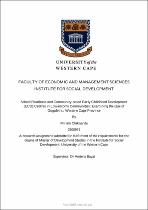| dc.contributor.advisor | Bayat, Amiena | |
| dc.contributor.author | Chikwanda, Miriam | |
| dc.date.accessioned | 2023-03-13T07:13:27Z | |
| dc.date.issued | 2022 | |
| dc.identifier.uri | http://hdl.handle.net/11394/9743 | |
| dc.description | Magister Artium (Development Studies) - MA(DVS) | en_US |
| dc.description.abstract | South African children’s access to ECD facilities has significantly improved over the years.
However, persistent negative learning outcomes nationally call into question whether children
are being adequately prepared for schooling. Most children in South Africa live in communities
characterised by limited resources and poverty. These children start their learning trajectory
with poor-quality early learning opportunities. The lack of quality early learning means that
poor children not only enter the schooling system ill-prepared to cope and excel, and remain
behind children who have had access to high-quality, well-resourced ECD facilities, but their
poor educational start continues to limit their learning and life opportunities well into
adulthood. The key to changing this is adequate school readiness preparation (SRP), including
key aspects of physical, socio-emotional, language and cognitive development. | en_US |
| dc.language.iso | en | en_US |
| dc.publisher | University of the Western Cape | en_US |
| dc.subject | Childhood development | en_US |
| dc.subject | Poverty | en_US |
| dc.subject | Children’s Act of 2005 | en_US |
| dc.subject | Western Cape Province | en_US |
| dc.subject | Teaching and learning | en_US |
| dc.title | School readiness and community-based early childhood development (ecd) centres in low income communities: Examining the case of Gugulethu, Western Cape Province | en_US |
| dc.rights.holder | University of the Western Cape | en_US |
| dc.description.embargo | 2024 | |

